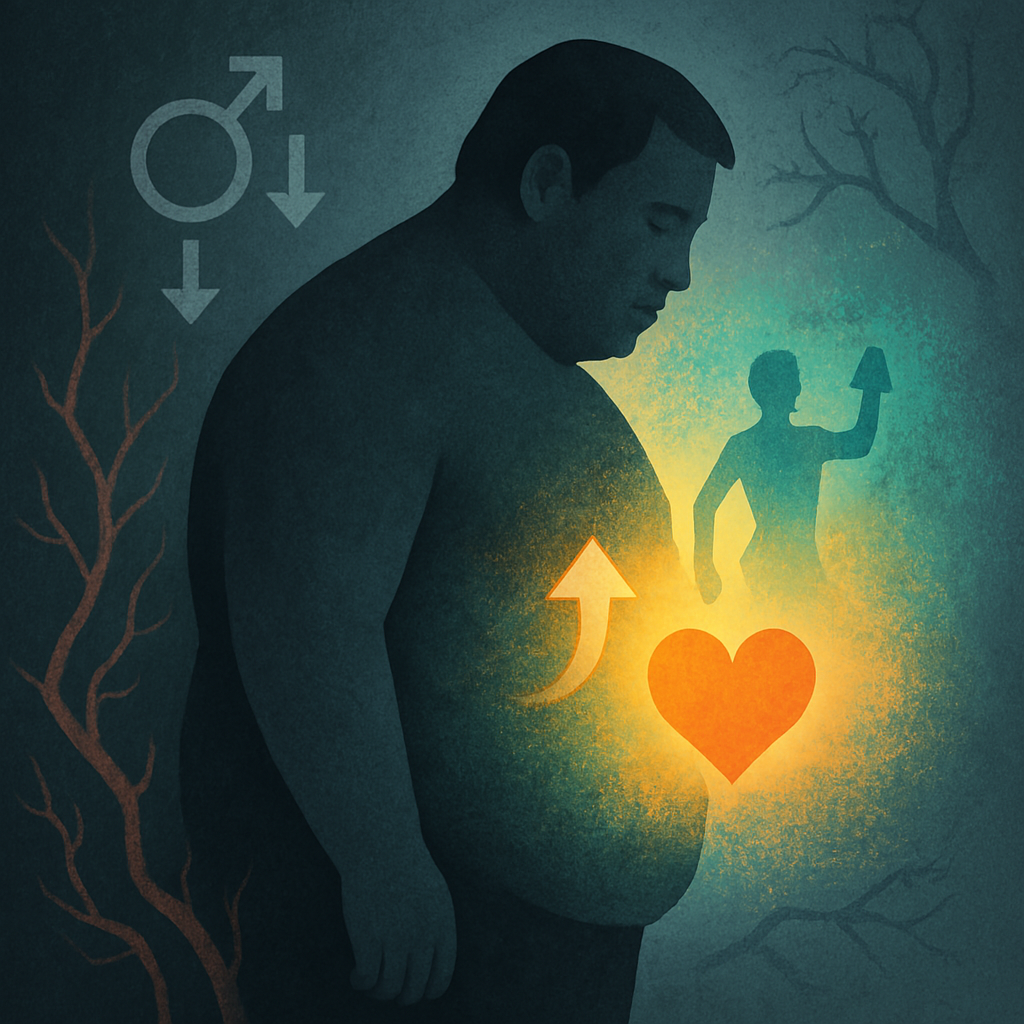A Heavy Burden on Sexual Health
Obesity doesn’t just affect appearance or mobility — it has a direct and powerful impact on sexual function, particularly in men. In fact, excess weight is one of the leading lifestyle-related causes of erectile dysfunction (ED). The more body fat a man carries, especially around the abdomen, the greater the risk of hormonal imbalance, poor blood flow, inflammation, and psychological stress — all of which contribute to ED. The good news is that addressing obesity not only improves erections but also boosts energy, confidence, and long-term health.
Why Excess Weight Affects Erections
Erections depend on healthy blood circulation, hormone levels, nerve function, and mental well-being. Obesity negatively influences all of these systems. Here’s how:
- Fat tissue produces estrogen and suppresses testosterone, weakening libido and erection strength
- Excess weight reduces nitric oxide, a key molecule that allows blood vessels to dilate during arousal
- Obesity increases inflammation, which damages blood vessels and reduces circulation
- Abdominal fat compresses pelvic arteries, restricting blood flow to the penis
- Mental health issues like low self-esteem, anxiety, or depression are more common in overweight men, which worsens ED through psychological pathways
The Link Between Obesity and Low Testosterone
Testosterone is critical for sex drive and erectile strength. In obese men, especially those with a high percentage of belly fat, testosterone levels often drop due to hormonal disruptions. Fat cells convert testosterone into estrogen through a process called aromatization. This hormonal imbalance leads to reduced sexual desire, fatigue, and difficulty achieving firm erections. Lower testosterone also affects motivation, muscle mass, and mood — making it harder to lose weight and easier to fall into a negative cycle.
Cardiovascular Risks and Erectile Dysfunction
Obesity is a major risk factor for hypertension, high cholesterol, insulin resistance, and type 2 diabetes — all of which damage the vascular system. Since the penis relies on small, sensitive arteries for blood flow, even early stages of cardiovascular disease can impair erection quality. ED can be the first sign of these deeper metabolic issues, making it an important early warning signal.
Sleep Apnea, Obesity, and ED
Many overweight men suffer from obstructive sleep apnea, a condition where breathing repeatedly stops during sleep. Sleep apnea leads to low oxygen levels, increased blood pressure, and poor sleep quality — all of which negatively impact testosterone and erectile function. Loud snoring, fatigue, and morning headaches may be signs of sleep apnea, and treating it often improves ED as well.
The Psychological Burden
Carrying excess weight often affects body image and self-confidence, both of which are crucial for healthy sexual relationships. Men with obesity may avoid intimacy due to shame, fear of rejection, or past negative experiences. This avoidance can strain relationships and reinforce feelings of failure or inadequacy. Addressing both the physical and emotional effects of obesity is essential for full recovery from ED.
The Good News: ED Is Often Reversible With Weight Loss
Unlike some causes of ED, obesity-related ED is highly reversible. Even modest weight loss — just 5–10% of body weight — can lead to significant improvements in erectile function, testosterone levels, and blood vessel health. As body fat decreases, the body produces more testosterone, reduces inflammation, and restores proper blood flow. Many men report stronger erections, improved stamina, and a renewed sex drive after losing weight.
How to Start Losing Weight for Better Erections
1. Adopt a Sustainable Diet
Focus on whole, nutrient-dense foods that reduce inflammation and stabilize blood sugar. Prioritize:
- Lean proteins (chicken, fish, legumes)
- Vegetables and leafy greens
- Healthy fats (olive oil, nuts, avocado)
- Whole grains in moderation
Avoid processed snacks, sugary drinks, fried foods, and excess alcohol.
2. Move Your Body Daily
You don’t need extreme workouts. Start with walking, swimming, or cycling for 30 minutes a day. Resistance training 2–3 times per week helps build muscle and increase testosterone.
3. Get Enough Sleep
Lack of sleep increases hunger hormones and cravings, while lowering testosterone. Aim for 7–9 hours per night in a quiet, dark room.
4. Manage Stress
Chronic stress increases cortisol, which leads to fat gain and hormone imbalances. Use breathing exercises, meditation, or physical activity to manage daily stress.
5. Track Progress and Set Realistic Goals
Aim for gradual weight loss (0.5–1 kg per week). Use progress photos, energy levels, and clothing fit — not just the scale — to measure success.
6. Consider Medical Support
For some men, additional help may be needed. Talk to a doctor about:
- Hormone testing (testosterone, insulin, thyroid)
- Nutritional counseling
- Medication or GLP-1 therapies for weight loss if appropriate
- Sleep studies to rule out apnea
Rebuilding Confidence and Sexual Vitality
As you lose weight, you may notice more than just physical changes. Mood, energy, and sexual confidence often improve dramatically. Morning erections may return. Sexual desire increases. Performance anxiety fades. These gains create a powerful motivation loop — the better you feel, the more consistent your healthy habits become.
Final Thoughts: Lighter Body, Stronger Erections
Obesity weighs heavily on your physical and sexual health — but it’s a modifiable risk factor. By taking steps to lose excess weight, you don’t just enhance your sex life — you reclaim energy, reduce disease risk, and boost confidence. Erectile dysfunction doesn’t have to be permanent. For many men, it’s simply a sign that the body needs support. And when you give it that support, the rewards extend far beyond the bedroom.
